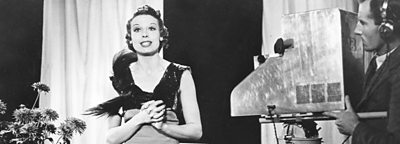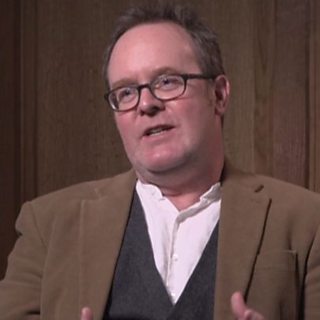The ��������'s – and the world’s – first regular high-definition television service started on Monday the 2nd of November 1936. A German service had begun the year before, but only offered pictures with 180-lines: the �������� had since decided that 'high-definition' meant 240-lines or higher, conveniently putting it ahead of all rival claims.
Although no direct recordings exist of those first day’s broadcasts from Alexandra Palace, the ��������'s own newsreel cameras were there to film proceedings. So we can see once more the exact moment when the new �������� Television Orchestra, conducted by Hyam Greenbaum began playing and the musical comedy star Adèle Dixon took to the studio floor, to sing 'Magic Rays of Light':
In that newsreel, the man seen reading a script, then looking up and glancing briefly to his right is Cecil Madden, the �������� producer in overall charge of output on the 2nd of November. In his Oral History interview, he reminds us that Dixon's song wasn't quite the very first item on this first day – nor was it really an 'opening night': proceedings began at 3 o'clock in the afternoon.
Before Dixon kicked-off a half-hour variety show at 3.30pm, the grand total of 400 or so 'lookers-in' dotted around London and the �������� Counties had had to endure some short speeches from government officials and �������� bigwigs. Madden describes what was happening behind-the-scenes in Alexandra Palace at this precise moment:
The variety show with Dixon and the American dancers also included 'The Lai Founs' – a plate-spinning act. By 4 o'clock it was all over, and the service closed down for the next five hours. The ��������'s Director of Television, Gerald Cock, had ruled that there should be breaks between individual programmes in order to "avoid eye strain" for those watching at home, but this extended break was also designed to avoid interfering with viewers' domestic life, including mealtimes and children's bedtimes.
When the service reopened that evening, the main attraction, as Madden mentioned, was Picture Page, a 30-minute variety show which the Radio Times described as a "magazine of topical and general interest". The night ended with a ten-minute edition of British Movietone News – the �������� didn't yet have a television news department of its own. Closedown was at 10pm.
The overall output of the new service was obviously quite limited – an hour between 3 and 4 o'clock in the afternoon, and another between 9 and 10pm. But since this would now be happening every day, Madden and his team were immediately faced with having to work out how to ensure a steady supply of programme-material – all on a budget of about £100 a day.
The overall scale and ambition of the first full week of programmes was also a matter of contention within the ��������, as Madden explains in his Oral History interview:
Once the initial excitement was over, the schedule quickly settled into a familiar pattern. The ��������'s television staff learned the crafts of directing, camera-operating, sound-mixing, and studio management rapidly, refining their techniques day-by-day. But the overall approach was declared to be one of "informality and brightness".
Not everyone in the �������� was impressed: the Corporation's accountants, especially, were anxious about the relatively high costs of television compared with radio. But it was generally agreed that the new medium of television – and the market for receiving sets – would not be sustainable if the focus remained on technology. As Peter Eckersley – the ��������'s chief engineer in the early days of Baird’s experiments – put it, "the programme and only the programme will maintain an enduring interest".
One month after 'opening night', the ��������’s Director-General, John Reith – rather wary of it all at first – admitted that he'd been more impressed by television than he'd expected – and that it would almost certainly develop faster than he'd ever anticipated.

